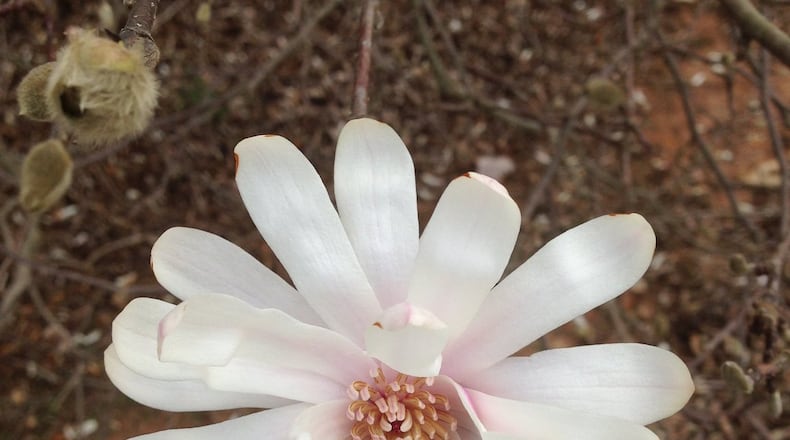Q: I had three potted parsley plants that suddenly wilted and died. There are white balls next to the stems. They pop when pressed and a sticky liquid comes out. Catherine Caubet, Newnan
A: Since no yellow, red, or pink bug guts came out when you pressed the balls, I think these are spheres of controlled-release fertilizer. Manufacturers form a plastic shell around granules of fertilizer. The fertilizer gradually dissolves through the shell to feed a plant. Some products can emit fertilizer for months after only one application. But if a lot of them are deposited around the base of a plant, it can damage the stem. When you buy potted plants, check for the fertilizer balls and scatter them across the potting soil with a stick.
Q: What are the white fuzzy things floating all over Cartersville? Several radio callers
A: They are hackberry woolly aphids. Paul Pugliese, University of Georgia Extension agent in Bartow County, says, "We had lots of rain this year. This equaled more sap flow and more aphid activity. We have them every year, but this year is exceptional." Still unexplained is why other parts of metro Atlanta have seen minimal hackberry aphids this year. Although the aphids are numerous, all you can do at this point is wash them off any surface where they accumulate. Consider treating your hackberry (sugarberry) trees with a systemic insecticide next May, after the trees bloom.
Q: Are there any heirloom tomato festivals in the Southeast? I'm looking for a way to taste a variety of heirlooms at once. Mary Fletcher, Orange Park, Fla.
A: Cartersville Ga., Raleigh N.C., Columbia, S.C., and Hendersonville, N.C., have yearly tomato festivals of some sort. You can find a full list at Pick Your Own (pickyourown.org/TomatoFestivals.htm). Locally, tour your area farmers' markets. They often have different varieties to buy and taste.
Q: Ten weeks ago I had bermuda sod installed in different places in my yard. I'd like to accelerate the new grass growing into the old grass by laying river sand down. Is it too late in year to do this? Michael Neri, Suwanee
A: You can help the sod grow into the existing grass, but not with sand. In a wheelbarrow, mix a 50-pound bag of play sand with two cubic feet of soil conditioner. Dribble it in the space around the sod pieces and lightly tamp it with your foot or palm. The bermuda won't grow much this year but it will next year.
Q: Is it too late to fertilize my centipede grass? Linda Pike, Newnan
A: Usually you fertilize centipede grass once or twice per year: one time in early May, another time in early July (if you think it needs it). It pretty much stops using fertilizer in mid-September. In the future, use a product that contains low amounts of phosphorus, like 15-0-15 or 16-4-8.
Q: In late July my star magnolia, planted last fall, suddenly almost completely defoliated. I kept it watered through the winter and only occasionally this summer since rain was frequent. It looked healthy in early July. Any idea what the cause is?John Champion, Fulton County
A: It sure sounds like a water or root issue to me. I know you watered this summer but my bet is that the roots have not lengthened very much from the initial planting. Slow root expansion is particularly common when roots in the original root ball are not untangled before planting. I know the planting tag for many trees and shrubs indicates that digging a hole a couple of times wider than the root ball is sufficient. But new research shows that removing most of the potting soil and untangling the roots to spread them in all directions in their new soil home is the best planting method. Grasp the trunk of your tree and try to wiggle it back-and-forth. If the root ball moves very much, the roots have not grown outward as much as needed to survive a short dry spell.
Q: How do I control lespedeza?Tammy Smith, email
A: I see two kinds of lespedeza that are problematic in lawns. Annual lespedeza, Lespedeza striata, is a low-growing annual plant; it sprouts from seed each year. Sericea lespedeza, Lespedeza cuneata, is an upright perennial plant. Both have tufts of three leaves arranged along the stem. Common lespedeza thrives in thinly growing lawn grass and on compacted soil. Your best option for control of either plant is hand pulling as soon as you spot it in early summer. Waiting until fall allows both plants to develop woody stems and deep, tenacious roots.
Q: Can you give me ways to decrease water holding in my back lawn? Water comes from a small hill on the side of my house. Might a rain garden help soak up some of the water?Tabatha Burks, Fulton County
A: If your lawn has a wet area, grass won't tolerate it. One option is to slightly excavate the area, to concentrate the water, then install plants that tolerate wet feet. I have lots of details on rain gardens, including a list of plants for damp soil and a rain garden manual at bit.ly/GAraingarden.
Q: On your website you write that butterfly bush is a good plant to attract butterflies. While that is true, the Georgia Department of Agriculture says butterfly bush is showing signs of becoming invasive.Eric Bowles, email
A: I know that other states have declared butterfly bush, Buddleia davidii, to be invasive but the Georgia Exotic Pest Plant Council (www.gaeppc.org/list) does not list it as being problematic at this time. I’ll take their word for it but I note that several new butterfly bush hybrids are described as sterile. You could plant them instead.
About the Author
The Latest
Featured

